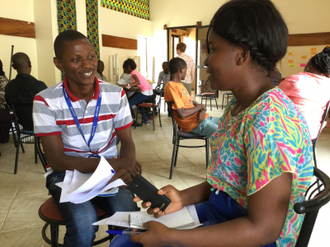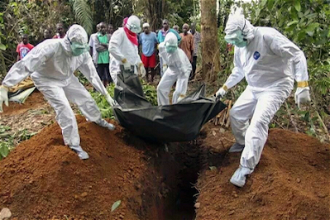Sierra Leone: Casting out the Devil in Freetown

Counselling session
On a hot and humid May evening in Freetown, the sound of chickens, truck horns and football commentary are drowned out by a gravel-voiced man, shrieking into a microphone. He sounds as if he is on the edge of hysteria as he growls and barks. He has been raving for half an hour, prompting me to leave my hotel to find out what is going on. He is so loud that work is impossible, anyway.
I find hundreds of Sierra Leoneans packed into a large hall, fanning themselves in the heat, watching the self-styled pastor pacing across the theatrically-lit stage. Portly, and dressed in a snappy pin-striped business suit, the pastor's fingers sparkling with bling. He calls people forward to be saved, and they leave their grubby white plastic chairs uncertainly. The women have elaborate braids, and wear brightly-patterned traditional dresses, their Sunday best. Their men look uncomfortable in crumpled suits and nylon shirts and ties that gape at the collar.
The pastor's wailing monologue does not cease for a second as he lays hands on a bewildered man whom he has selected from the crowd. His screams build into a crescendo, and it seems, to the uninitiated observer, that he might have a seizure at any moment. He veers between the local Crio language and English too distorted by the PA system to understand. When I ask a young man hovering in the doorway near me, what is happening, he smiles.
"The pastor is casting out the devil," he explains, with a flash of amusement in his eyes.
"Do you believe he's actually casting out the devil?" I ask.
The man laughs, embarrassed.
"So why are you here?" I persist.
"There's electricity and music," the young man admits. "When the sun goes down, there isn't much else going on, except watching soccer on the TV in a bar, and that requires spending money on a drink."
At that moment, the man to whom the pastor has been directing his woeful narrative collapses, and the audience roars its approval. Another soul is saved at the Flaming Red Hot Prophetic Mission.
I went to Sierra Leone because my small NGO, Network for Africa, is training local social workers, officials and police to counsel survivors of Ebola and the civil war. Of those who contracted Ebola, 27% died, (about 4,000 people between 2014-6). However, the rest recovered. Yet, it is likely they will be affected by serious health concerns for the rest of their lives. Moreover, they are stigmatised in a culture where superstition is widespread.
Well-meaning development officials in the wealthy white world are often uncomfortable when confronted by the grip that magic and the fear of evil spirits still has in many countries receiving aid. But "sensitisation training" will fail if we ignore the fact that many people believe Ebola (or disability for that matter) is a consequence of angry ancestors or bad juju. For instance, a nurse in neighbouring Liberia who had risked her life helping afflicted patients throughout the Ebola crisis, later bled to death during childbirth because no medical staff wanted to touch her.
Attending our sessions is Foday, a 28-year-old single father. He had to move away from his home district when the mother of his daughter died of Ebola. His family and neighbours shunned him because of what had happened to his girlfriend. He was struggling to find a job, despite his qualifications, because the shadow of Ebola hangs over him.
Also at our trauma counsellor training is Marie, an official from the ministry of social welfare. She told me that each day during the crisis, she had collected children from the hospital green zone, where Ebola survivors were moved once they were well enough to leave the red treatment zone. The epidemic made orphans of thousands of children. Marie would painstakingly trace any surviving family members, and then deliver the children to them, following several weeks of trauma counselling.
Marie also had to assess how likely it was the child would prosper with their extended family. In too many cases, distant relatives would regard the surviving children as either potential domestic slaves, or as possessed by evil spirits. Marie told me it was common to find the children hawking bottles of water on the streets of Freetown; they had been sold to traffickers or handed over to strangers who promised to provide education and lodging for the children.
When I asked her what it had been like, during the crisis, Marie recalled the long, stressful days, trying to find safe homes for Ebola orphans. Each night when she reached home she would strip off all her clothes on the veranda and bag them, then scrub every inch of her body with hand sanitizer in the shower. She would collapse into bed, exhausted. But for months she was sleeping alone because her husband had moved to the spare bedroom.
I expected Marie and the others to be critical of how long it had taken the World Health Organisation to respond at the start of the Ebola epidemic. But, as so often in desperately poor African countries, there was forgiveness. "We're all human," Marie commented. "Once they got here, they were really good. And we remember the British sent their medical ship. That was very helpful."
Sierra Leone, a country the size of Scotland, with a population of seven million, has had more than its share of tragedy. Between 1991 and 2002, a devastating war claimed 50,000 lives. "There isn't a family in this country that wasn't affected in one way or another, by the war or Ebola, or both," said Amadou, his gap-toothed smile faltering for a moment. His own father died of malaria, age 45. "He worked so hard all his life, providing for his family, that when he caught it, he had no resistance. He was gone within a week."
We conducted training sessions in which participants role-played traumatised clients, based on their own experiences. It emerged that every person there had lost a close family member in the war. An important technique in countering flashbacks is to teach people to visualise a safe place from their past, into which they can retreat when terrible memories overwhelmed them. In the case of some of our participants, they could not dredge up a happy childhood memory that didn't lead to a horrific one. Instead, we asked them to create an imaginary safe place. Several of them chose the days they had spent with us as their most secure moments in life so far.
Adding to the legacy of war and disease is grinding poverty that ranks Sierra Leone at the bottom of the UN's human development index. Yet, our participants were enthusiastic and optimistic. In March, a new government was elected, promising reform and an end to the eye-watering corruption of the past. The president, Julius Maada Bio, has started impressively, unifying the administration's bank accounts and publishing revenue and expenditure figures on a monthly basis. He has paid civil servants, and instituted a regular clean-up day when everyone in the nation gets to grips with the appalling litter problem.
"We are hopeful," said Amadou. Less euphoric was his colleague Samuel, old enough to have adult recollections of the civil war. "We'll see what happens," he said quietly.
To support Network for Africa's work, please visit www.Network4Africa.org

















